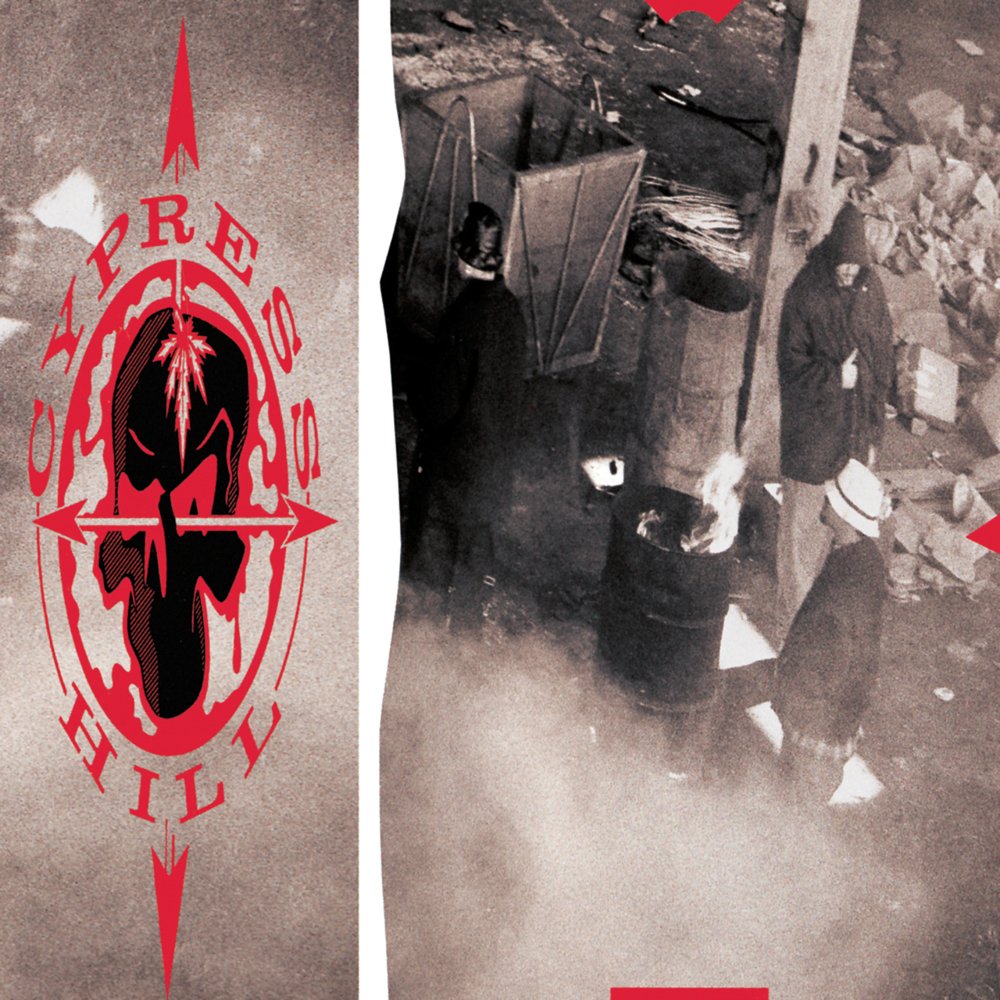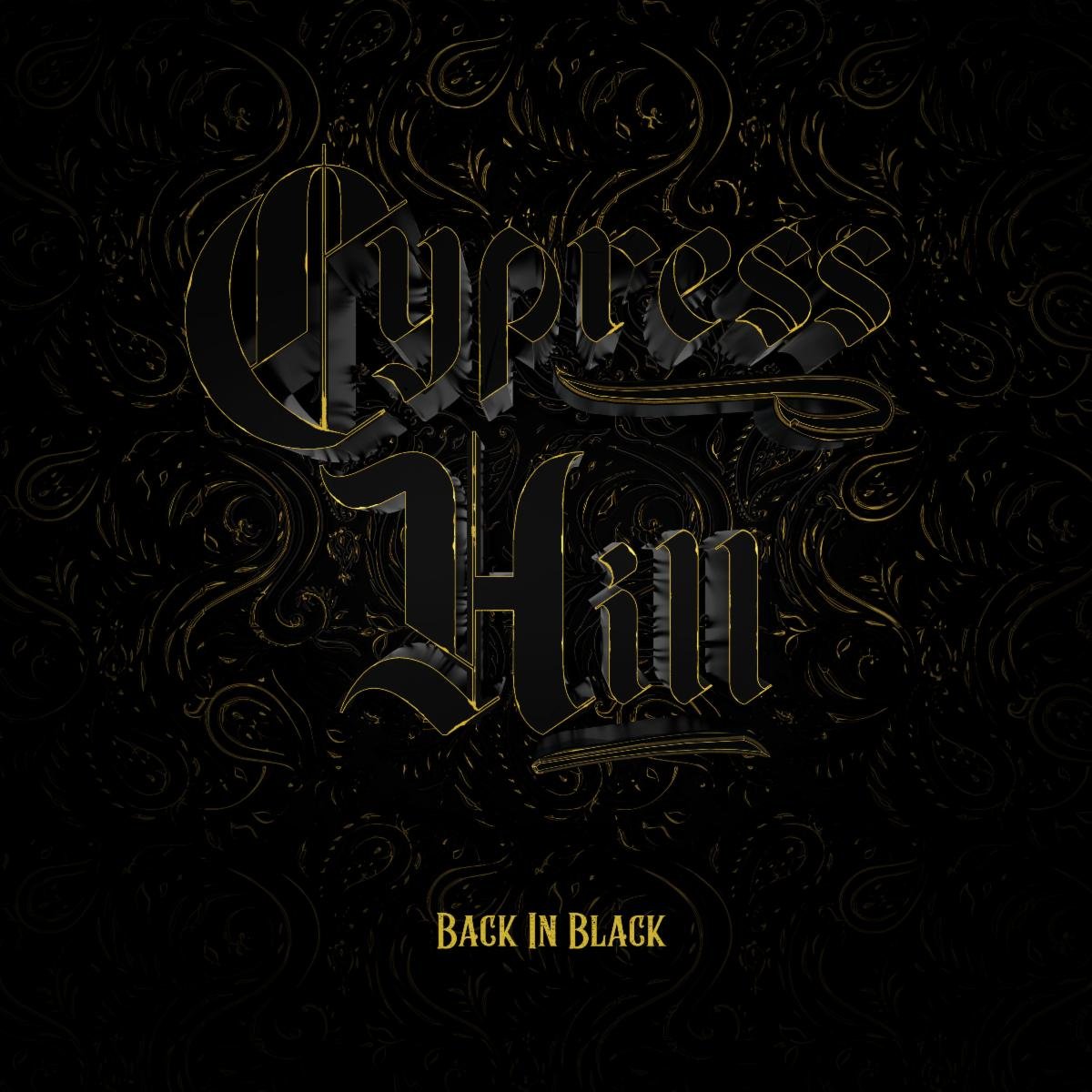Happy 30th Anniversary to Cypress Hill’s second studio album Black Sunday, originally released July 20, 1993.
The crossover success of Cypress Hill has always been fascinating. The Southern California-based group is hardly the portrait of a collective whose music sounds like it was crafted to sell millions of units. It’s dark and dusty “gangsta” rap, featuring tales of blood-soaked revenge and anti-police screeds, juxtaposed with hymns to consuming copious amounts of marijuana.
Cypress Hill became fairly unlikely stars after the release of their self-titled debut album in 1991. It featured the nasal vocal tones of Louis “B-Real” Freese paired with the gruff, husky rhymes and ad-libs of Senen “Sen Dog” Reyes. Lawrence “DJ Muggs” Muggergud handled the production, crafting a gritty soundscape made up of samples from late ’60s soul and rock, often paired with vocals from the film Wild Style.
Based on the success of songs like “How I Could Just Kill a Man,” “Hand On the Pump,” and “Latin Lingo,” the album went double platinum and gained crossover acceptance. The group took part in the second Lollapalooza summer tour in 1992, and their videos received play on MTV. They also received play on commercial radio, and often on alternative rock-based stations. Maybe it was the references to weed, or maybe it was because sometimes great music gains acceptance across all boundaries.
Cypress Hill released their follow-up album Black Sunday 30 years ago. Even a three decades later, the album remains hard to classify. It features their most commercially successful single, but still feels darker and less accessible than Cypress Hill. It barely features any of the rapping in Spanish, which had become a well-known part of their repertoire. One thing that remains clear is that the group’s initial success didn’t alter their musical approach. The group plays to their strengths, subject matter-wise. A fair share of the real estate on Black Sunday is used to extol the virtues of smoking marijuana, while even more space is given to grim tales of street reality.
B-Real continues his lyrical excellence; while he’s perhaps known for the nasal voice, he’s an extremely capable emcee. And while Sen Dog is best known for functioning as a marijuana-fueled Flavor Flav/Bobby Byrd, he continued to improve as a rapper. DJ Muggs remained adept behind the boards, often creating an even more menacing musical palette for the album. On Black Sunday, he specializes in digging up deep, resonant, and almost hollow-sounding basslines that enhance much of the album’s gloomy feel.
Yet Black Sunday was a massive commercial hit, and their most successful album to date. Based largely on the success of its first single “Insane in the Brain,” it’s certified triple platinum. In terms of quality, it’s not quite as good as Cypress Hill, but remains a rock-solid follow-up and features some of the group’s most unheralded songs.
Watch the Official Videos:
Cypress expresses their love for Mary Jane early on Black Sunday, opening the album with “I Wanna Get High.” The subdued track has an ethereal feel, as B-Real seems to float through the track on the proverbial cloud of marijuana smoke, rapping over a sample of Junior Parker’s version of “Taxman.” B-Real has explained the song as a tribute to Leena Marley (Bob’s mother) and her song “Searching For a Joint.” “Hits From the Bong” is another marvelously mellow ode to smoking cannabis, as B-Real urges his audience to temporarily put down the blunts and the joints, and try using the ol’ water pipe when consuming some herb.
“Insane In the Brain” is an upbeat, pulsing, circus-like track earned the group major play on radio and MTV, and the corresponding official single was certified Gold. The song later appeared in such cultural institutions as The Simpsons and was featured in the film Zoolander.
B-Real has always marveled at the song’s success, considering that it was recorded as a dis to Chubb Rock. The group felt the Brooklyn-based emcee had disrespected the group throughout his album I Gotta Get Mine, Yo (1992), particularly on the single “Yabba Dabba Doo.” Both emcees get their licks in, but Sen Dog goes particularly hard, rapping, “Fat boy on a diet, don’t try it / I’ll jack yo’ ass like a looter in a riot / My shit’s fat, like a sumo, slamming that ass / Leavin’ your face in the grass.”
“When the Shit Goes Down,” the B-side to the “Insane…” single, sports a bluesy feel, with B-Real rapping over a sample of Outlaw Blues Band’s “Deep Gully.” B-Real keeps things economical, rapping two shorter verses and allowing the call-and-response chorus and the beat to have their time to shine. Cypress Hill tended to excel at making funky songs dedicated to inflicting violence. “3 Lil’ Putos” contrasts the bouncy sample of Lou Donaldson’s version of “Ode to Billie Joe” with verses by B-Real and Sen Dog hunting down their adversaries.
“I Ain’t Going Out Like That,” the album’s second single, exemplifies Black Sunday’s darker tone. It’s the only song on Black Sunday not produced by DJ Muggs, as T-Ray crafts a sinister track anchored by samples from Black Sabbath’s “The Wizard” and “Wicked World.” Their performance of this song on Saturday Night Live managed to get the group banned from the show. Against explicit requests by the show’s staff, DJ Muggs lit up a joint on stage at the beginning of their performance. The group was subsequently barred from performing on the show again.
Cypress Hill continued to seek blood-soaked revenge on “Lick a Shot” and “Cock the Hammer.” They’re two of the most rugged songs on the project, both prominently featuring ragga-dancehall influences and vocals. The former, which was released as a single overseas in Europe, is the faster paced of the two, a bassline-driven ode to ruling the streets through violence. Again, B-Real is preoccupied with revenge, rapping, “Had a bad dream, woke up in a casket / Now I can't even get back at the bastard / Bull-shit! This pine box / Ain't strong enough to contain the Afro ’locks.”
Enjoying this article? Click/tap on the album covers to explore more about Cypress Hill:
“Cock the Hammer” is the Black Sunday’s gloomiest entry, but still one of its best songs. Muggs expertly flips the bassline from Flora Purim’s “Uri,” layering in noise from a rainstorm. While Sen Dog promises his foes that he’ll “roll ya up and smoke you like cones,” B-Real scoffs at those who attempt to test the crew, rapping, “Cry on a pillow, weepin-ass willow / The Hill got the skill for the static like brillo.”
Though Black Sunday remains an excellent listen, at times it seems like an EP that was stretched about 10 to 15 minutes past its ideal length. This is most apparent on its second side. It starts strong with the aforementioned “3 Lil’ Putos” and “Hits From the Bong,” but then loses a bit of momentum with a pair of unnecessary instrumental interludes and “What Go Around Come Around, Kid,” the album’s weakest song.
The inclusion of two songs from over a year prior to Black Sunday’s release is a bit odd. First is “A To the K,” which originally appeared on White Men Can’t Rap, the bonus EP to the White Men Can’t Jump soundtrack. The crunchy track, complete with its continuous low wail of sirens, does work well with the flow of Black Sunday. However, “Hand On the Glock,” a re-working/remix of their successful single “Hand On the Pump,” is more out of place. It first appeared as a B-side to their “Latin Lingo” 12-inch and it’s not a bad song by any stretch, but it just doesn’t quite fit in with the rest of the long player.
The album ends on a strong note with “Break ’Em Off Some,” an under three-minute tale of violence told at break-neck pace. B-Real describes multiple tales of being on the run, be it ducking through alley-ways while trying to evade rivals or speeding down the highway in a stolen Mack truck while being chased by police. And no matter the aggressor, B-Real always remains defiant, rapping, “They got me cornered lemme just warn ya / I’ll pull this trigga make your family mourn ya / Boo-hoo! Where ya gonna run to / When I pull out the scooby doo.”
Overall, much more of Black Sunday works than doesn’t, and its success allowed Cypress Hill to continue on their path toward more mainstream acceptance. The project established that Cypress Hill was committed to creating uncompromised, unapologetic music. They never felt the need to reinvent the wheel, but always knew their strong suit, and shined at delivering what their audience grew to love.
LISTEN:
Editor's note: this anniversary tribute was originally published in 2018 and has since been edited for accuracy and timeliness.



